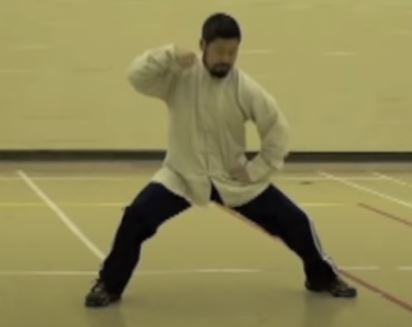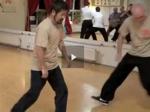This article first appeared in the May/June Issue of Brazil Tai Chi
Magazine (Revista Tai Chi Brasil), and has been translated from
Portuguese to English.
In the practice of taijiquan, “qi” or vital energy is very important. Many systems of taijiquan and other martial arts practice different types of qigong to strengthen this vital energy. In the hunyuan taiji system, the recognition of the importance of this energy has inspired the creation of hunyuan qigong, which is so complete that it can be considered a qigong system in itself and not only a complement to the practice of taijiquan.
What is Hunyuan Qigong?
Hunyuan Qigong is a system of qigong (chi kung) which is part of the system of hunyuan taiji (tai chi), created by Master Feng Zhiqiang, a disciple of Chen Fake, a famous master of Chen style taijiquan. But before becoming a disciple of Master Chen, Feng was a disciple of Master Hu Yaozhen,
a scholar of Chinese medicine, and master of xinyiquan and practices of Taoist and Buddhist meditation. Hu was considered the father of modern qigong in China. Master Feng used the some of the best facets of his two masters’ systems to create the system hunyuan taiji, which includes hunyuan qigong. The product was a system of taijiquan that follows the rules of qigong very well.
The name hunyuan is composed of “hun” or circle and “yuan,” or mixed (may also mean “origin.”) It may also be said that the system is based on these “circles” or flows arising from the universe. These circles are part of this “original” energy that flows in the universe, nature and humans.
Qigong systems generally fall into 3 classifications: religious (e.g. Taoist), martial and medicinal. Hunyuan qigong is classified as the martial type because in addition to health benefits, it also provides benefits useful for martial arts such as taijiquan. It is important to know that while
hunyuan qigong uses concepts from Taoism such as yin and yang, this does not mean that the system is linked to religion. It’s simply a system of exercises that anyone can do to enjoy the benefits associated with this practice.
In the system of hunyuan taiji, empty hand forms (sequences of movement) are considered important while practices with conventional weapons are considered complementary. However, hunyuan qigong is an essential element of the system of hunyuan taiji. While many systems use qigong as a complementary exercise, the system hunyuan taiji includes qigong practices so complete that they can be seen as a complete system of qigong in themselves.
Components Hunyuan Qigong
1. Zhan Zhong: Exercises done in a static way, i.e. without physical movement. The purpose is accumulation and purification of vital energy. The practice is similar to meditation. The practitioner may stay motionless up an hour in the same position, with certain benefits similar to someone doing traditional exercises. This is a paradox of the practice.
2. Jiben Gong: Also called “chansi gong” (a common exercise in Chen Style Taijiquan), this is also a type of qigong, also focusing on fundamentals of taijiquan. This type of qigong focuses on developing a specific type of energy for the practice of taijiquan.
3. Forms: These are dynamic, i.e. involving movement. These exercises are grouped into
sets of repetitive movements. Their focus is on circulation of vital energy through the physical movement of the body (similar to taijiquan, but with repetition of the same movements). In the system hunyuan qigong basic forms include Hunyuan 12 Hunyuan 24.
4. Ruler: Hunyuan qigong also includes exercises involving the use of rulers which are short sticks useful for supporting various types of twisting and rotational movements.
NOTE: It is important to recognize that forms, or sequences of taijiquan also have certain elements and benefits of qigong. In fact, practitioners of taijiquan often gain the benefits of qigong without knowing that they are doing qigong! However, taijiquan practitioners must also focus on many other things, including martial intent and rules of taiji. Qigong is focused specifically on the development of vital energy and is more useful for those who want to focus on this point. Qigong practice is very deep and each practitioner may decide exactly how much he wants to learn about it.
The Basics Hunyuan Qigong
There are hundreds of qigong systems. Regardless of the system, these should follow the same basic principles. Hunyuan qigong also follows these principles. The basic theory of qigong involves the circulation of vital energy and its balance in human beings so as to maintain and improve their health. Blockage or imbalance of this energy can cause disease.
3 Treasures: human beings must care for three treasures in their bodies in order to maintain health.
• Jing: the production of “jing” or physical essence, is the raw material.
• Qi: jing is “burned” to produce qi, the vital energy of human beings.
• Shen: the qi energy is accumulated and refined to produce spiritual energy, or “shen.”
3 Regulations: the qigong practitioner must regulate or manage the following.
• Structure of the Body: to create a structure that does not obstruct the flow of energy. Rules include the position of the head, shoulders, chest, tongue, spine, waist and knees.
• Mental Activity: to focus and concentrate on the activity of qigong, without distractions. Hunyuan
qigong has methods to direct the focus of the person inward to increase concentration and eliminate
distractions.
• Breathing: involuntary or voluntary control of respiration. At the beginner level, hunyuan qigong uses natural breathing, or breathing without voluntary or forced control.
The Practice of Qigong Hunyuan
It is said that “without the vital energy (qi), the practice of taijiquan is empty. ” This means that movements of taijiquan are supported by the vital energy, and without the development of this energy practice of taijiquan will only be an exercise without many benefits and without much force. It also means that a component good taiji is the development of the vital energy of the practitioner. The practice of hunyuan qigong focuses on this development. The form hunyuan qigong 12 movments is the most fundamental one of the system, but already involves all the qigong essentials. This exercise should be done without distractions, in a quiet place. The movement of the body during these exercises helps guide the energy through the body’s energy channels and other important areas.
Characteristics of Forms Hunyuan Qigong 12 and 24
• Exercises tha circulate the vital energy in all channels and key points of the body.
• Focus on directing the vital energy back to the main dantian (center of energy) of the body at the end of each exercise.
• Self massage techniques used to dissipate accumulated energy at the end of the exercises.
Benefits of Hunyuan Qigong in the Practice of Taijiquan
In the system of hunyuan qigong, we believe that qigong practice should have measurable and real outcomes at each level. One of the characteristics of hunyuan qigong is this measurement. This does not mean that practitioners will have instant results, or have pressure to achieve results, but the correct practice of hunyuan qigong should produce consistent results in the practitioners. Some results are: warm or tingling sensations, improved circulation, stress reduction, vigor, resistance to disease, resistance to blows and projection of energy.
The benefits of hunyuan qigong begin with health benefits, but the more serious the practice, the better the results will be for your health and taiji practice. For example, the stance of the practitioner will be strengthened by lowering the energy into the earth. With specific training, the practitioner can also withstand blows without being injured and have more power for the practice of tui shou (push hands). In advanced levels the practitioner can “transmit” energy through his body like a “bullet” of energy.
Conclusion
The practice of hunyuan qigong can be done by anyone, regardless of the age of the practitioner. In addition, the system promises and delivers proven results such as good health and even inner strength to advanced practitioners. Better yet, practitioners need not deeply understand the science behind the practice in order to gain positive benefits. They just need to practice.
About the Author
Shifu John Vanko has been a practitioner of Taijiquan, Qigong and Kung Fu since 1986. He is a private student of Master Chen Zhonghua, disciple of Masters Feng Zhiqiang and Hong Junsheng. Currently John is responsible for the Hunyuan Taiji Academy do Brasil based in São Paulo, Brazil which offers lessons in Chen Style Taijiquan, Hunyuan Qigong and Praying Mantis Kung Fu. Website http://br.chenzhonghua.org
For a video on hunyuan qigong go to: http://practicalmethod.com/2010/05/hunyuan-qigong-onlinei-video-trailer/



{ 5 comments… read them below or add one }
I am starting to understand what Qi is practicing this form from Master Chen’s DVD very good instruction and theory.
I have introduce this to my students in a medically based wellness center in Peterborough NH I gave them your website information to purchase one to practice.
Suzanne
I’ve been studying Taiji PM with Ping Wei here in Phoenix for about a year and a half. A few weeks ago he gave a two-hour workshop teaching us the Hunyuan Qigong movements. Back in the day, when I practiced Kundalini yoga, the magic number was 40. Do a particular meditation for forty days and change will occur. I had no insight into which of the Qigong exercises would be best for me so I decided to practice the whole eleven each day for forty days and see what happens. I am excited to say, just a few days into the practice I found the ground! I look forward to seeing how else the Qigong adds to my Taiji practice.
Hi,
Your article on Hunyuan qigong is excellent Can i print and add as a handout to my students? I will include your bio and contact info. I am a student of meehan and zhang.
I remember meeting your teacher at the 3rd international Hunyuan competition and conference in 2012…
Best,
Shawn
Shawn, no problem. Go ahead. You have my permission. Thanks.
Thanks